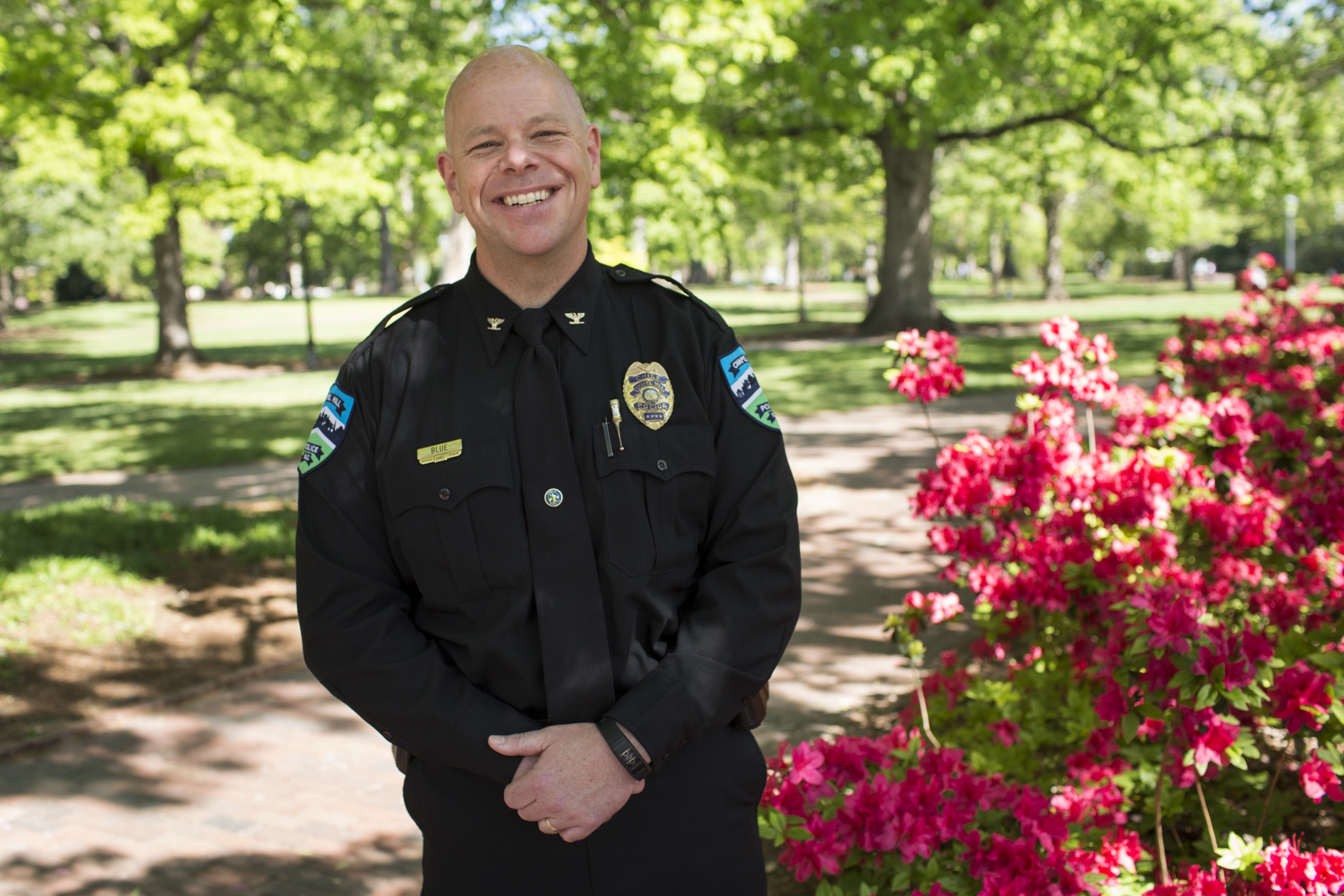Hometown Police Chief Goes Back to School
Every September, the UNC School of Government hosts North Carolina’s public officials to help them learn about all of the functions of local government beyond their own specialties.
More than 3,200 municipal officials have completed the UNC School of Government’s flagship Municipal and County Administration course since the municipal section began in 1954, and 1,800 county officials have completed the county section since 1964.
Among the most recent 100 graduates on April 22 was Chris Blue, the Chapel Hill police chief.
“When you’re immersed in your own discipline every day,” said Blue, “its good to get out of the office, in the classroom with other professionals, and hear different perspectives on the many issues local governments deal with.”
Like most law enforcement professionals, he’s worked on his professional development annually. This year Blue attended the Municipal and County Administration program at the School of Government.
Faculty member Greg Allison said that the number of participants representing the various areas of public safety, like Blue, saw a considerable spike in the years immediately following 9/11, mainly because of grant funding at that time. But word-of-mouth has sustained high numbers of law enforcement participation in the years since.
Through the course, Blue learned about the broad functions of local government.
“I see my fellow Chapel Hill department heads all the time,” said Blue, “but even though we collaborate at times, I haven’t had the time to learn the details about their work. This class has given me the opportunity to see what other officials face on a daily basis and to get a 30,000-foot view of local government.”
As someone who teaches in the police academy, Blue was also paying attention to how the instructors taught the class.
“I was blown away by their knowledge and the work they put into the material,” he said. “They have motivated me to be a better, more prepared presenter.”
Blue now hopes to bring the new knowledge back to his hometown police department.
A Home Town Chief
A Chapel Hill native, Blue graduated from UNC-Chapel Hill in 1990 with a degree in radio, television, and motion pictures. Watching his classmates leave the area to start work in the major media markets of Atlanta, New York, and Los Angeles, it became clear to Blue that he did not want to leave his home town or his family.
Blue got a job in sales for an architectural hardware company as he considered his next step. Eventually, he decided to pursue an MBA and was accepted at Wake Forest, but he deferred enrollment and took on a second job in a Durham restaurant to save money for tuition.
There, he made friends with a coworker who was also debating his future. After a night of watching the TV show, COPS, both applied to the Chapel Hill Police Department. His friend was accepted pretty quickly, but it took a little more time and perseverance—two years, to be exact—for Blue to be hired.
That delay provided a life lesson.
“When I was finally hired by Chapel Hill,” Blue said, “my goal was to be the hardest worker they had on the police force.”
In 2010, Blue was named Chapel Hill police chief after 13 years with the department. In that time, he had served as patrol officer, crime prevention officer, sergeant, lieutenant, captain, and assistant chief.
Nearly 20 years later, Blue is chief of the department he worked so hard to become a part of, and his friend from the Durham restaurant, Andrew Smith, is captain of the investigative unit.
Being police chief in one’s home town has its ups and downs.
“Police work, which I think is fundamentally vital to a community’s health and safety, is even more satisfying when it’s your home,” Blue said.
That’s the upside. Knowing and caring about the town, knowing many of the people, the politics, and the culture—all that helps someone committed to a philosophy of work akin to that demonstrated by Sheriff Taylor on the Andy Griffith Show.
“As corny as it sounds, Blue said, “I teach at least one class each year where the Andy Griffith Show is used to demonstrate expert community policing.”
But being police chief in his home town isn’t all good times.
He said, “I’ve crossed paths with people I know who are at their very worst—they’ve made a bad decision or are victims of a crime or tragedy—and it’s more difficult when you know the person.”
A College Town Chief
In addition to Chapel Hill being Blue’s hometown, it is his college town, and he is keenly aware of the unique nature of policing in this environment.
“Families from around the globe send their young people here and entrust us with their safety,” he said. “It is not lost on us that for many, this is their first foray into the world.”
Blue is also aware of the diversity of this university community, and says that Chapel Hill was one of the first agencies in the state to bring in a national law enforcement trainer on implicit bias. Offers participate in an annual refresher on the subject in addition to their ongoing mandated training. Blue also serves on the Judicial District 15B Racial Justice Task Force, formed to examine the impact of race in our local criminal justice system.
“Every time you have one of these discussions about bias,” he said, “you open you mind a little and your capacity for self-reflection is enhanced.”
Blue heads a complex and critical department of nearly 160 Chapel Hill employees, including 120 law enforcement officers plus parking services and other staff. His enthusiasm for the job, which started two years before he was first hired, never seems to waiver.
“If you love your town—and I really do love this town,” Blue said, “being a public servant for your home is an assignment that’s hard to beat.”
Published April 26, 2016



